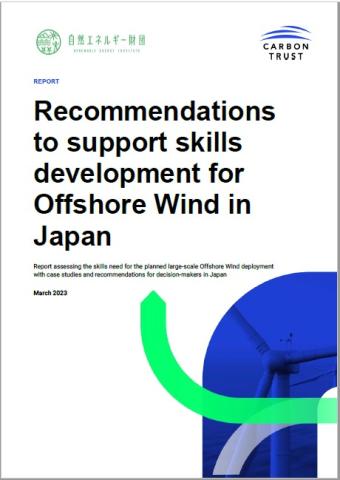Key findings
Below we summarise several key takeaways for decision-makers in Japan.
- Good collaboration underpins successful skill markets: while skills remain a bottleneck for all offshore wind markets, strong collaboration and communication between government, industry, and education institutions, has led to many effective skills-related measures and actions.
- Skills plans must be underpinned by a just transition and a whole-systems approach: it is key to engage stakeholders from across different areas to design relevant skills solutions.
- Decision-makers must make use of their sphere of influence to ensure skills development activities can build up from local spaces across the whole of Japan. Close collaboration between international, regional, domestic, and local entities is crucial for rapid action.
- Skills solutions must understand what problem they are solving: this report identified four critical barriers, which are the country’s general labour shortage, limited industry knowledge, the lack of clarity on the future of offshore wind and decarbonisation in Japan, and work-based cultural barriers.
- Decision-makers should leverage skills development practices from other industries.
In addition, the report provides five detailed recommendations, which are structured by target audience, timeframe, key actors, barriers addressed, and suggested steps; and supported with international case studies.
タイトル: 日本の洋上風力産業におけるスキル形成支援のための提言
日本の大規模洋上風力産業拡大のための、海外の事例を参考にしたスキルニーズ評価と意思決定者への提言
概要
洋上風力は、日本が2050年までにカーボン・ニュートラルを実現するために欠かせない重要な産業である。カーボン・ニュートラル社会への移行には、日本における労働力のスキル向上を促進するために、意思決定者による早急な対応が必要である。日本は、カーボン・ニュートラル達成、グリーン・ジョブの創出、再生可能エネルギーによるエネルギーの国内生産拡大のために、海洋産業を発展させる野心的な計画を掲げている。
近年、洋上風力発電市場は、魅力的な政策と競争的な入札制度によって急速に拡大している。将来的には、洋上風力発電事業のパイプライン(一連の段階)において、スキルを持つ洋上風力発電従事者に大きな需要が生まれると思われる。したがって、意思決定者の今後の課題は、カーボン・ニュートラル経済を実現するために、労働力のスキル開発イニシアチブを適切に実施することであろう。
主なメッセージ
本レポートの調査と分析から得られた、日本の意思決定者にとって有益となりうる主な知見は以下の通りである。
- スキル市場の発展には、優れた協働が必要である:世界のいずれの洋上風力市場においてもスキルは依然として課題であるが、政府、産業界、教育・研究施設の緊密な協働により、効果的なスキル関連対策が多く取り組まれている。
- スキル計画は、公正な移行とホールシステム(全体システム)アプローチに基づいていなければならない:さまざまな分野のステークホルダーを巻き込んでスキル課題解決策を設計することがカギとなる。
- 意思決定者は影響力を行使し、スキル開発にかかる取り組みを日本全国の現場から促進させなければならない。早急な対応を行うためには、国外、地域、国内、地方の各主体の緊密な連携が重要である。
- スキル課題解決策には、解決すべき問題が明示されている必要がある:本レポートでは、労働力不足、洋上風力における業界固有の知識や専門性の不足、洋上風力産業と脱炭素化における将来の見通しが明確でないこと、そして労働文化における障壁という、日本における4つの重要な障壁を特定している。
- 意思決定者は、他の産業のスキル開発アプローチを参考にできる。
なお、本レポートでは、提言の対象者、時間軸、主要な関係者/組織、対処すべき主な障壁、推奨される対策の5つの観点から詳細な提言を行い、海外の参考事例も取り上げている。
日本の洋上風力産業におけるスキル形成支援のための提言 (pdf)


